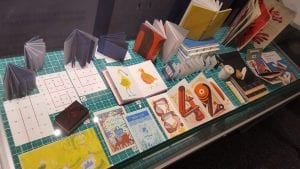This is the third in a series of four posts about using library collections for the study of black history, literature and culture, in Britain and abroad. We would love to hear your comments and questions about the posts: please tweet us @GCWLibrary, email us at library@lincoln.ac.uk, or tell us your thoughts in the comments section at the end of the post.
If you have been on the ground floor of the library in recent weeks, you may have seen the Library Snippets platform just opposite the enquires desk. Each week of October, the plinth has been hosting recordings of answers to commonly asked questions about the library, as well as poems by Black poets, accompanied by a transcript. We hope you have enjoyed the chance to stop and read or listen to these works.
If you would like to know how to find out more about the poems and poets, read on! This post will discuss how library resources can be used to study the lives and works of black British poets. In the first half, I will discuss how to find the work of a particular poet. In the second half of the post, I will discuss how to find scholarship, secondary readings, and references works about particular poets.
Continue reading “Studying Black British Poetry”
